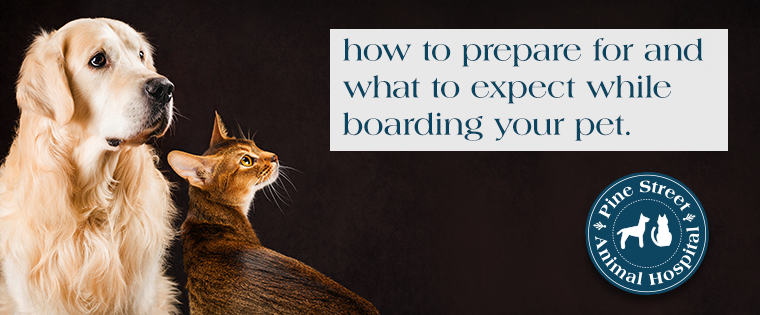Most of us never want to be away from our pets ever, much less for an extended period of time. But situations do arise when we have to board our four-legged family members and entrust them with someone else. In this post, we will give you some tips to make the experience easier on you and your pets.
Picking out a facility is the first step in the process. Talk to friends and family who board. Find out what they like and don’t like. Get references to facilities. Is cost an issue? Remember that the most expensive isn’t always the best and the cheapest may not be the worst. Call around and go visit. Meet the staff and observe the animals that they have there. Is the facility clean? Does it smell bad or is it odor neutral? How much play time do the animals get each day? What size are their runs/cages? Are cats boarded away from barking dogs? Is it climate controlled?
After you have chosen a facility, you then need to find out what it requires from you and your pet. Although vaccine protocols are changing and pets are being vaccinated less and further apart, each facility will have its own guidelines that may differ from those of your veterinarian. For example, we use and require a bordetella/parainfluenza (kennel cough) vaccine that is an annual vaccine, whereas some facilities will require this vaccine every six months. Once you know the requirements, try to get them met as soon as possible. Most vaccines take 10-21 days before full immunity is reached and your pet is fully protected. Vaccinating the day of (with very few vaccine exceptions) does NOT provide immediate protection for your pet or the others in the facility.
If your pet is being treated for any chronic conditions and is on medications for these, make sure that you have their medications labeled and organized so the staff can easily administer those during your pet's stay. This also includes bringing any special foods labeled with special feeding instructions. For pets with sensitive stomachs, it is a good idea to bring their own food and label it with how much and how often they are to be fed. Most facilities will provide food for your pets but our finicky pets really like their own food. Bringing your own food can help reduce the chance of stress and food change-induced colitis and diarrhea.
Through no fault of the facility, sometimes medical emergencies arise. Make your instructions detailing what you would like the facility to do in this case VERY CLEAR! Give them a good contact number so that the staff and the veterinarian can get in touch with you to discuss your pet should the need arise. I cannot stress enough how important this is. If owners cannot be contacted and there are no clear treatment and financial instructions, the facility and the veterinarian in charge are obligated to do everything that they can to treat and save your pet.
Lastly, don’t be afraid to ask questions and make special requests. Each pet is unique and different, and our goal is to make them as safe and happy as possible while you are away. The more that we can do to maintain a sense of normalcy for your pet, the more that you can relax and enjoy your trip, and your pet can enjoy its stay.
Wm Glenn Adcock, DVM



